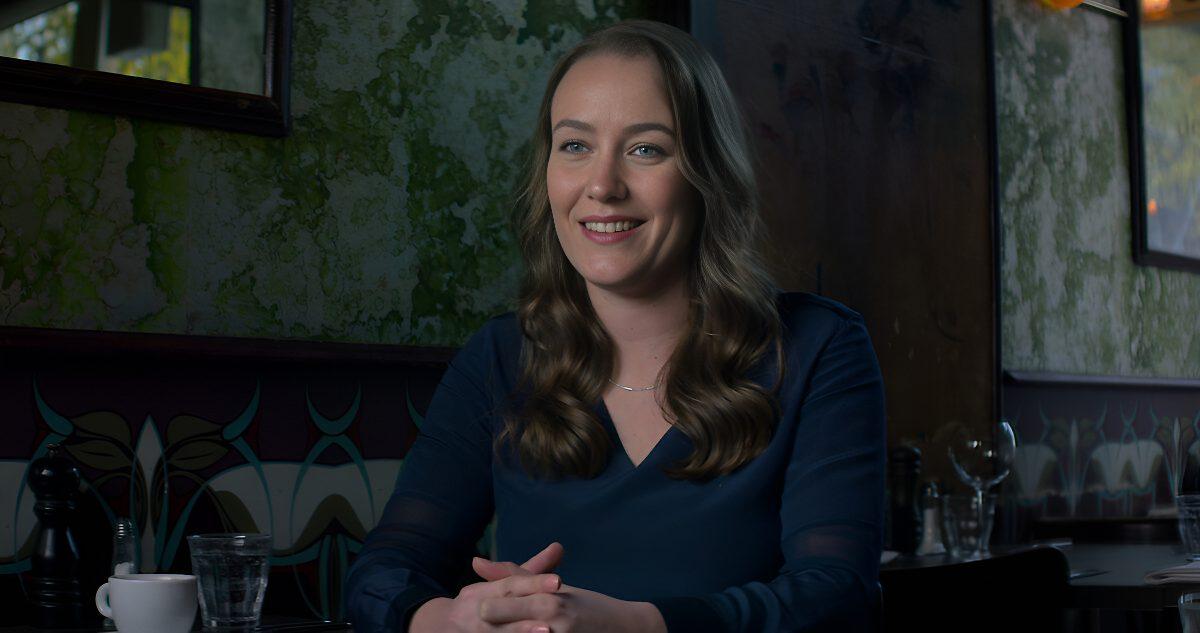Ayleen Charlotte first came to prominence after featuring in the Netflix documentary, The Tinder Swindler, which aired in February 2022. The film became a big streaming hit, while also shining a much-needed spotlight on the epidemic of romance scams, as Ayleen and two other victims recounted how they had been tricked and defrauded by a romance scammer, Simon Leviev.
Since the documentary, Ayleen Charlotte has received much coverage and praise for her anti-romance scam activism. Earlier this year, the Global Anti-Scam Alliance (GASA), together with our friends over at ScamAdviser, honored Ayleen as ‘Scam Fighter Person of the Year’ 2023. The jury, which included Mitchel Chang of Trend Micro and Donna Gregory of the FBI’s Internet Crime Complaint Center, selected Ayleen because:
“What makes Ayleen unique is that she not only came forward and reported the crime but also participated in the Netflix documentary Tinder Swindler to gain more attention to this horrendous kind of crime. She is a role model for other (romance) scam victims.”
Recently, we got the chance to sit down with Ayleen for an interview, in which we discussed her harrowing experience, the great work she’s been doing since, and a vision for the future.

1. Hi Ayleen, thanks so much for joining us. Firstly, can you tell us about how The Tinder Swindler documentary came to be, and how you got involved?
Yes, of course. So I was already in contact with Pernilla [Sjöholm], one of the other victims from The Tinder Swindler. She said she was working on a documentary and put us in contact. The production company chased me for over eight months before I said yes — because I really needed to think about it.
Eventually I said yes because I thought that if I kept this story to myself, then nothing would happen to the criminal. I wanted to get justice for what he did to me. Nothing had happened with my case or any of his other victims since 2010. I asked a lot of friends and family if they thought it was a good idea for me to participate and they all said yes.
Ultimately I believed my story needed to be told because I also wanted to inspire people who were in the same situation as I was, and I wanted to show them how to turn the tide and take things into your own hands again, even in this horrible kind of situation.
2. In January, you were honored as “Scam Fighter Person of the Year” by our partners, the Global Anti-Scam Alliance (GASA). What did this award mean to you? It must feel great to be recognized for your work.
The award really meant a lot to me. In the beginning when I came forward, there were a lot of negative responses online, blame etc. — and you kind of feel like you’re being victimized all over again. I gave a talk at the GASA summit in November and finally felt some recognition where people were enthusiastic and interested in what I had to say. When GASA contacted me about the award, I felt very proud because it shows that courage can be rewarded.
I’m proud of sharing my story with the world and also breaking down the taboo and shame about fraud victimhood. Only 7% of scams are reported, and just 0.05% of cybercriminals are prosecuted. These numbers really need to go up and that’s what I’m fighting for.
3. Before your ordeal, had you heard much about romance scams, or known of any victims?
Not really to be honest. Before I was defrauded, I was mostly just aware of those Nigerian prince schemes! Maybe a little here and there because of TV and stories in magazines — but I never heard of anyone I knew being scammed. After I found out I was defrauded, I got in touch with a lot of victims, some from Simon [Leviev] as well. That gave me more strength and support, speaking to people who understand.
4. To your credit, you realized what was happening a lot quicker than many would — and even turned the tables on the scammer! Nonetheless, do you think, if there was more awareness of romance scams, your ordeal could have been avoided?
Yes! If there was more education, coverage, awareness of the red flags, and organizations had warned me at an earlier stage, I could have woken up earlier. But it’s very difficult to wake up victims of fraud because they are mentally under the control of, and dependent on, the fraudster. You need a very careful approach towards fraud victims. That’s why I’m working to assist organizations in creating a new strategy for their fraud departments to deal with this better in the future.
5. Can you list some potential red flags that suggest you’re dealing with a romance scammer?
If someone is pressuring you to loan money then please just step back and maybe think about it for a few weeks. Ideally, please say no! First of all, fraudsters hate that — that time delay. If you say no, and you keep on saying no, eventually they will leave — and then you will know for sure the reason why they were with you.
I know that scammers (romance especially) can be charming and convincing. But as soon as it’s not 100% going their way, they can quickly become aggressive and nasty. And it’s not normal for someone making a big request to be angry and rude.
Yes, if I’m going to ask a good friend of mine to loan some money, I will obviously let them think about it. But fraudsters don’t do that; they keep pressuring you and pressuring you. What I know now, is that they get frustrated because they don’t have complete control over you. And so this hesitation is itself a good way to test a character.
When I had no more money to give Simon, I was already talking to the police. He went from being very sweet to angry. . . to death threats, then back to sweet. . . He was like 15 different types of people in one week. It was really, really crazy.
Any other red flags?
I think the love bombing. If you’re dating a normal guy, they might be very nice, but they aren’t as extremely nice as Simon was in the beginning. You wake up with very sweet messages from the beginning. . . They say “I love you” at a very early stage, “you are the only one for me” — things like this. He called me excessively throughout the day. Looking back he was trying to get into my mind.
It’s difficult to think about though — of course, it’s not a flaw to fall in love, or to look for it. That’s why these manipulations are so awful.
6. What advice would you offer someone who has become the victim of a romance scammer?
Create a support system around you. Try to look for a family member or a good friend to be with and share your story with, because that’s the first step to healing. I was lucky that I had family and friends to turn to — after the fraud, they were my biggest support. The second step is going to the police ASAP and reporting the crime because if you stay quiet then the criminal wins.
7. You’ve served as a great role model to other victims, and it’s taken a lot of bravery. Many victims feel great shame and embarrassment. What would you say to someone who was hesitant to come forward?
Please come forward. When people keep these stories to themselves, they keep the feeling of shame and end up victimizing themselves over and over again. It can lead to mental health problems — and I’ve heard of people taking their own lives. Please try to look for support, even if it’s just one person who can go with you to the police, one person who you can talk to. . .
Yes, it’s not a burden that can or should be faced alone.
The only way to heal is to talk about it.

8. What more can be done to combat romance scams?
What I’m trying to fight for, partly, is more focus on the victims — support and remediation. I only hear about preventative measures, but I think of the people who have fallen prey to romance scams. We need to improve the process for when a victim is calling up a company (like a dating app) to report the crime. Several times, when I spoke to companies and organizations, their response was just: “Oh, this is really bad, but thank you for your story — and good luck.”
Obviously, that didn’t help me. It only made me mentally worse, because you have absolutely no idea what to do. If victims feel they’ll be understood, they’ll be more likely to open up. Currently there is nothing.
I also think there should be algorithm-based warning systems on dating apps. Unlike a romance scammer, who treats it like a job and is online constantly, the average person does not have such free time to spend all day on an app. There is a new romance scam tactic for example, called a “pig scam”, in which rows and rows of predators are just sitting behind desks, chatting constantly on dating apps in search of victims. Excessive use or abnormal actions should cause an alert.
I also think banks should have alert systems in place, for when a person’s spending or transfers increase dramatically. They should get in touch and ask if everything is alright.
9. Do you have any projects or events that you would like to mention here?
Recently, I was the keynote speaker at the 2023 ACFE Fraud Conference Europe. The ACFE is great; they’re a big fraud fighting community with over 90,000 members. I also spoke at CyberSec Europe to a great audience, including people from the European Commission, and held an inspirational speech for the customers of BioCatch in London.
I have other things ongoing too, for example, being on the advisory board of GASA. I have a few projects being developed as well — partly in relation to my hopes above. Aside from this, I also started a Dutch wine company called AY-Wines. It’s my two favorite things — helping people, and wine!
Cheers to that.
10. Looking forward, are you optimistic about the fight against romance scams? Raising awareness is key, so it’s great to see the work of people such as yourself.
Yes, in the past year alone, I have met so many beautiful people who want to come together and fight romance scams. It needs the input of victims too, and their stories. The documentary was great for raising awareness. I think together we only become stronger; if we put our hands together we can fight this crime.
Thank you so much for joining us Ayleen, for sharing your story, your thoughts, and the great activism work you do.
As always, we hope this article has been an interesting and useful read. If so, please do SHARE it with family and friends to help keep the online community secure and informed — and consider leaving a like or comment below. Lastly, with scams on the rise, it’s a good idea to stay one step ahead. Here at Trend Micro, we have two FREE tools which will help there: the anti-scam extension, Trend Micro ScamCheck, and our ID Protection platform.
Here’s to a secure 2023!
1 Comments
- By Ruth Bartrom | June 24, 2023
Other Topics
